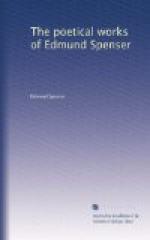XXVII.
Thou that at Rome astonisht dost behold
The antique pride which menaced the skie,
These haughtie heapes, these palaces of olde,
These wals, these arcks, these baths, these temples
his,
Iudge, by these ample ruines vew, the rest
The which iniurious time hath quite outworne,
Since, of all workmen helde in reckning best,
Yet these olde fragments are for paternes borne:
Then also marke how Rome, from day to day,
Repayring her decayed fashion,
Renewes herselfe with buildings rich and gay;
That one would iudge that the Romaine Daemon*
Doth yet himselfe with fatall hand enforce
Againe on foot to reare her pouldred**
corse.
[* Romaine Daemon, Genius of Rome.]
[** Pouldred, reduced to dust.]
XXVIII.
He that hath seene a great oke drie and dead,
Yet clad with reliques of some trophees olde,
Lifting to heaven her aged hoarie head,
Whose foote in ground hath left but feeble holde,
But halfe disbowel’d lies above the ground,
Shewing her wreathed rootes, and naked armes,
And on her trunke all rotten and unsound
Onely supports herselfe for meate of wormes,
And, though she owe her fall to the first winde,
Yet of the devout people is ador’d,
And manie yong plants spring out of her rinde;
Who such an oke hath seene, let him record
That such this cities honour was of yore,
And mongst all cities florished much more.
XXIX.
All that which Aegypt whilome did devise,
All that which Greece their temples to embrave,
After th’Ionicke, Atticke, Doricke guise,
Or Corinth skil’d in curious workes to grave,
All that Lysippus practike* arte could forme,
Apelles wit, or Phidias his skill,
Was wont this auncient citie to adorne,
And the heaven it selfe with her wide wonders fill.
All that which Athens ever brought forth wise,
All that which Afrike ever brought forth strange,
All that which Asie ever had of prise,
Was here to see. O mervelous great change!
Rome, living, was the worlds sole ornament;
And, dead, is now the worlds sole moniment.
[* Practike, cunning.]
XXX.
Like as the seeded field greene grasse first showes,
Then from greene grasse into a stalke doth spring,
And from a stalke into an eare forth-growes,
Which eare the frutefull graine doth shortly bring,
And as in season due the husband* mowes
The waving lockes of those faire yeallow heares,
Which, bound in sheaves, and layd in comely rowes,
Upon the naked fields in stalkes he reares,
So grew the Romane empire by degree,
Till that barbarian hands it quite did spill,
And left of it but these olde markes to see,
Of which all passers by doo somewhat pill**,
As they which gleane, the reliques use
to gather
Which th’husbandman behind him chanst
to scater.
[* Husband, husbandman.]
[** Pill, plunder.]




